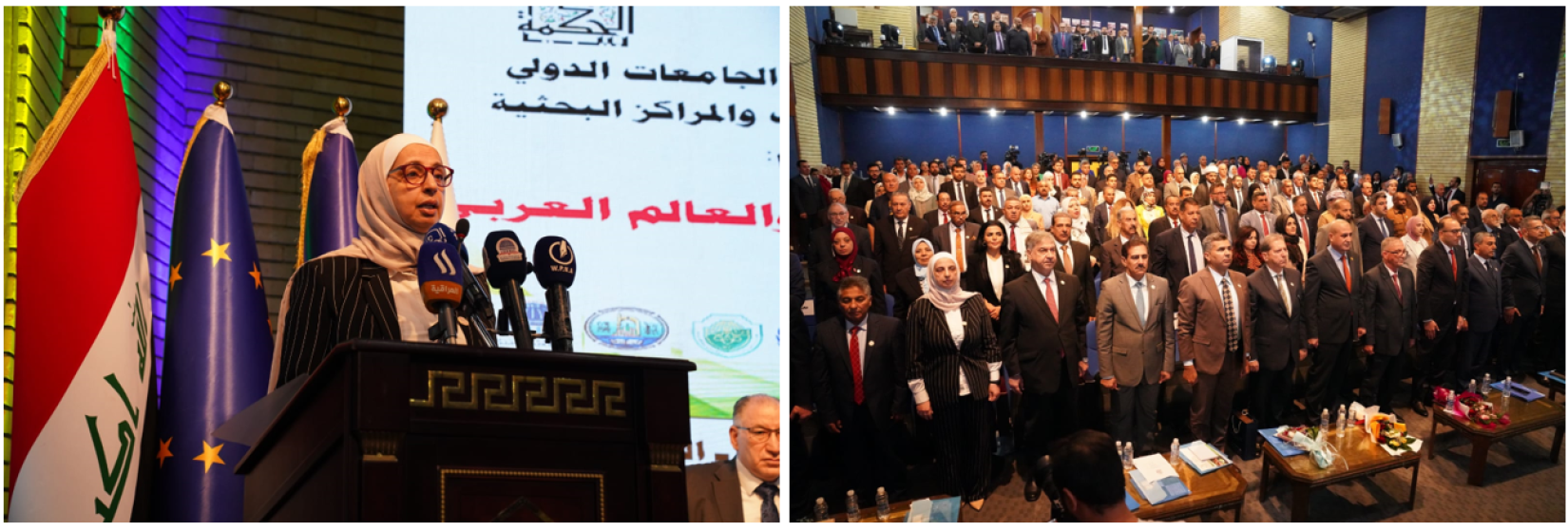Human security and sustainable development in Iraq and the Arab World: Reality, Challenges, and Ways Forward
16 November 2023
A conference organised by the Baghdad-based Bait Al-Hikma think tank, in cooperation with the ILO and several academic entities, focused on issues related to achieving human security and sustainable development and some of the challenges and solutions in Iraq and the region.

Baghdad, Iraq (ILO News) An international conference was held in Baghdad on the 15th and 16th of November, bringing together academics, stakeholders, tripartite constituents and partners from across the spectrum, to discuss issues related to sustainable development and human security in Iraq and the Arab World.
The two-day event was held Under the Patronage of the Prime Minister of Iraq, H.E. Mohammed Shia'a Al-Sudani, and organised by the Baghdad-based Bait Al-Hikma think tank, in collaboration with the International Labour Organization, the Journalists Syndicate, the International Federation of Universities, the Areed platform, and several Iraqi and Arab universities, academies, and research centres.
Among other partners, the ILO provided technical and financial support for this conference as part of boarder efforts of a European Union funded programme to reform social protection in Iraq.
The conference shed light on the reality of sustainable development in Iraq and the Arab World through 160 research papers conducted by academics from across the region. Participants included those from Jordan, Lebanon, Egypt, Libya, Oman, Saudi Arabia, Algeria, Tunis, Morocco, Syria, Yemen, Somalia, Sudan, the United Arab Emirates, and the Occupied Palestinian Territory. Some of the studies will continue to be presented virtually next week.
The research and discussions aim to identifying some of the threats and challenges facing human security, while exploring the relationship between human rights and sustainable development goals in Iraq and the Arab World.
“This conference sheds light on the reality of sustainable development in Iraq and the Arab World through research and statistics, to identify the most significant threats to human security at the individual, family, and societal levels. We would like to thank everyone who contributed to the success of this conference,” said Adnan Ibrahim Mohammed, representative of the President of the Republic of Iraq, H.E. Abdullatif Jamal Rashid.
“This conference comes at an appropriate time, as Iraq continues to suffer as a result of climate change. This is where the role of scholars and researchers is important, in drawing up policies in this regard, and guiding the decision makers on the right paths to pursue,” said Aref Al-Saadi, cultural advisor in the Iraqi government on behalf of the Prime Minister.
The 2030 Agenda for Sustainable Development includes 17 Sustainable Development Goals (SDGs), which focus on the economic, social and environmental dimensions of sustainability. The conference delved into the issue of human security and the important role it plays in bringing about positive change and promoting a better future for all - hence contributing to the Sustainable Development Goals in Iraq and across the Arab World.
“The conference will formulate a set of proposals that will contribute to addressing these issues and finding solutions to these challenges,” said Adel Baghdadi, Vice Chairman of the Board of Trustees of Bait al Hikma.
The conference was divided into four main themes. The Conceptual and General Framework of sustainable development, focused on the challenges and historical development of human security in the Arab World. The Social Field examined issues related to the role of human and social capital in sustainable development, including women empowerment, the role of civil society, demographic transitions and good governance. The Economic Field looked at the relationship between the quality of education, labour market demands and job opportunities and related issues and challenges, such as youth unemployment, food security and the role of the private sector in stimulating production and investment. The fourth and final theme focused on the Environmental Field, related to combatting pollution, climate change, and challenges related to water security, environmental degradation and depletion of natural resources.
ILO Country Coordinator for Iraq Maha Kattaa emphasised the importance of decent work to sustainable development and human security in Iraq. In her presentation, Kattaa highlighted some of the pressing challenges facing Iraq’s labour market, such as high unemployment among women and youth, high levels of informality, gaps in social protection coverage, and their impact on income, education and standards of living.
Kattaa also highlighted the importance of ILO Recommendation No. 205 on Employment and Decent Work for Peace and Resilience, which provides guidance on addressing world-of-work issues in response to crisis situations, including health pandemics, armed conflict, natural disaster, environmental degradation, and forced displacement.
ILO’s work in Iraq and across the region is grounded in Recommendation No. 205, where employment, decent working conditions and social dialogue help contribute to peace and resilience, within the framework of the Humanitarian-Development-Peace Nexus.
“Adopting an integrated approach that contributes to job creation, and that strengthens social protection, rights at work, and social dialogue will bring Iraq closer to achieving its Sustainable Development Goals, namely SDG 1, SDG 5 and SDG 8,” said Kattaa.
“The support of the International Labour Organization to the Government of Iraq and social partners, through the implementation of the Decent Work Country Programme, puts the people of Iraq at the heart of development efforts that promote the decent work agenda and social protection,” Kattaa added.
Under the European Union funded programme to reform social protection in Iraq, the ILO and Bait Al-Hikma have been collaborating through monthly roundtable discussions on key issues related to Iraq’s labour market and its social protection system. Similar to this conference, these sessions centre around evidence-based research developed by ILO and key scholars and academia. They seek to strengthen dialogue and propose systematic and context-specific solutions to ensure inclusive economic growth and social development in Iraq.
See also:
PROJECT PAGE: https://www.ilo.org/beirut/projects/WCMS_832046/lang--en/index.htm
INFOGRAPHIC: https://www.ilo.org/infostories/en-GB/Stories/The-ILO/peace-and-resilience - the-ilo-mandate
For more information, contact:
Marwan Tawfeeq
International Labour Organization
Wisam Al-Behadili
International Labour Organization


